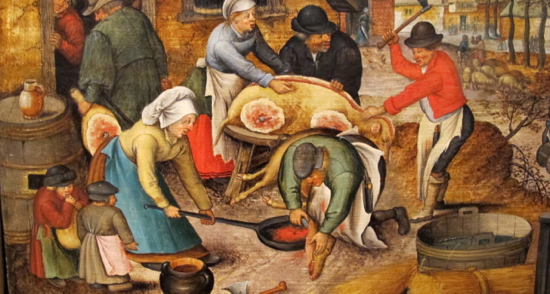Pre- and Proto-Puddings

The word “pudding”, it’s thought, comes down to us from the Latin word botellus which basically means “sausage.” Boudin is how the word occurs now in French. Pudim is the Portuguese version, pudín the Spanish. Sounding a little familiar now? Thought so. But did spotted dick and sticky toffee pudding really start out as sausage? Yes. Sort of. Here it helps to take a brief — and very general — look at early days of sausage making.
Say you’re a Bronze Age subsistence farmer living somewhere in Europe. It’s fall and you’ve just slaughtered your pig. You’ve taken all the choice cuts off the carcass for the season’s big feast, but you’ve still got plenty of other stuff left. The meat scraps you chop up and stuff in a casing with fat to make hard sausage that’ll last maybe a year. But that still leaves you with the organs and blood. You hate to waste it, but that sort of offal will start to spoil in a matter of hours if it isn’t either eaten or cooked. What to do?
There aren’t any pots or pans laying about. The stable you’re working in certainly isn’t a kitchen. And anyway, it’s the Bronze Age. So you pick out a bladder or a stomach, wash it in a nearby stream, and stuff it with the organ meat and blood plus and a few handfuls of grain or bread crumbs to bind the whole mixture together. You tie it up, boil it and presto — you’ve got a stopgap solution that will feed your family for week or more.
These were the first puddings. Known as “black” puddings today, they were distinct from typical sausages in that they weren’t part of any long-term preservation strategy. Rather they were a short-term keeping tactic that prevented the waste of valuable protein. Here is where the origin of pudding starts to resemble the beginnings of pie, at least for me. Both were common methods for extending the shelf life of scraps and leftovers. The main difference is that where pies were baked, puddings were boiled.
So fine, pudding and pies, lovely. How do we get from there to tapioca? More on that in the next installment. Gotta get a little work done.
I’ve always loved Brueghal, nice choice of illustration Joe
Thanks, Warren…me too!
– Joe
Joe,
Thanks for all the food history items, and please keep it up. An understanding of the past is key to appreciating the present, especially when considering the bounty of food we now enjoy.
Nancy
Truer words were never spoken, Nancy! Thanks very much — and I shall! 😉
– Joe
Thanks Joe! I’ve always wondered why the UK called deserts puddings!
My pleasure, Judy!
– Joe